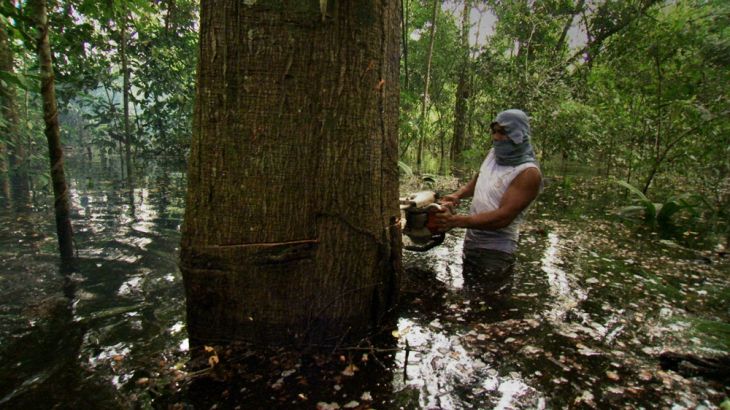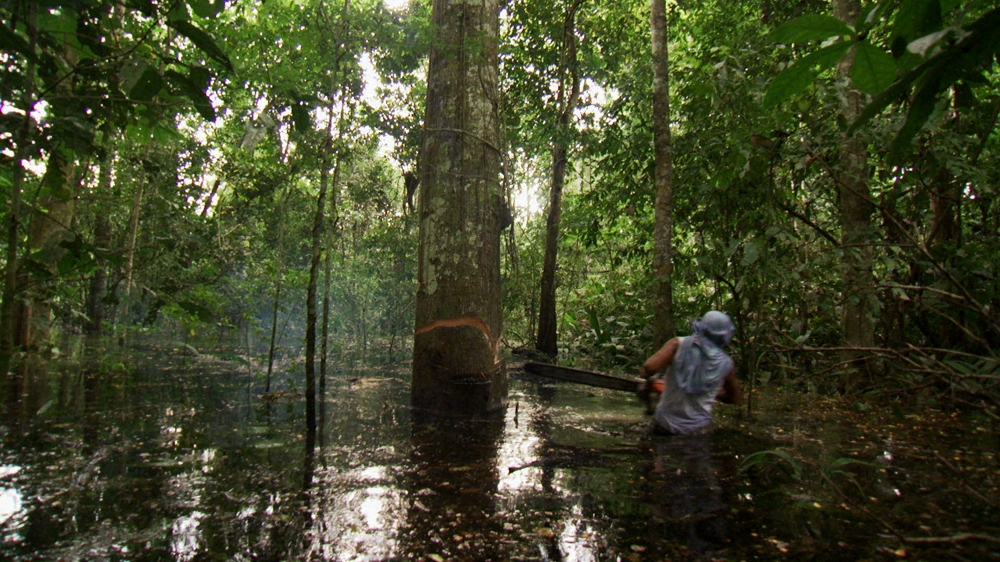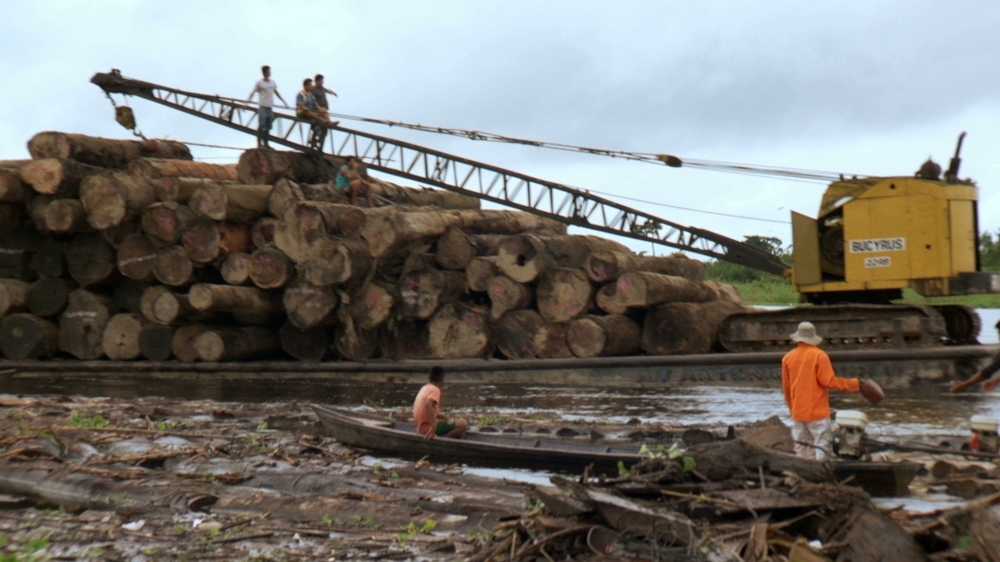
Peru’s Rotten Wood
People and Power exposes how Peru’s Amazonian rainforest is being stripped bare by corruption.
Peru’s vast and ancient rainforests are vital to the global response to climate change, home to an astonishing diversity of plants and animals and integral to the way to life of indigenous peoples.
They are supposedly protected by government regulation and international law.
Keep reading
list of 4 itemsThis researcher found billions in ‘invisible’ gold in Jo’burg’s mine dumps
Are seed-sowing drones the answer to global deforestation?
Rainfall set to help crews battling wildfire near Canada’s Fort McMurray
Yet every year tens of thousands of trees are being chopped down and exported illegally around the world. We have been to investigate the corruption that lies behind this rotten trade.
FILMMAKERS’ VIEW
By Bob Abeshouse and Luis Del Valle
Protecting the Amazonian rainforest is critical to combatting global warming. The tropical forest mitigates the effects of fossil fuel emissions and helps regulate climate patterns by absorbing massive amounts of carbon dioxide. Yet today the Amazon basin is experiencing large-scale deforestation from loggers and others cutting the forest for commercial purposes.
Last year, the rainforest absorbed less carbon dioxide than Latin America produced from fossil fuels for the first time in history.
It's not one company that is doing bad business. It's everybody.
What is happening in Peru is a big part of the problem. This South American country bordering the Pacific has 70 million hectares of tropical forest, the fourth most in the world and the second largest expanse of Amazonian rainforest after Brazil. Peru’s Amazonian region is also one of the most biologically diverse on the planet.
Legislation to control logging and better manage the rainforest in Peru was passed in 2000, and the 2009 US-Peruvian Free Trade Agreement demanded aggressive oversight of the timber trade.
But the industry remains rife with corruption today. According to a World Bank study, 80 percent of the timber traded in Peru has an illegal origin. Millions of cubic metres of wood – tens of thousands of trees – are cut down illegally each year.
The corruption in Peru reaches from loggers who cut the timber illegally to public officials who exploit the regulatory system for personal gain; from lumber companies shipping the wood with fraudulent documents, to businesses in the United States, China and other countries that turn a blind eye to the corrupt system and profit by importing the “rotten” wood.
Individuals and companies in Peru must be granted a concession by federal authorities to cut wood in designated areas. An operating plan to log within the concession area must be approved at the regional level each year.
“In that detailed plan you need to go to the field and you need to map all the trees that you are going to harvest,” according to Julia Urrunaga, the Peruvian director of the Environmental Investigation Agency NGO. “You need to identify them with GPS coordinates and you need to identify the species. And then you can produce the documents that will allow for the trading of that timber.”
The documents, called Transport Guides, are also issued by regional officials.
Urrunaga, whose organisation published a 2012 report on the timber industry in Peru called The Laundering Machine, says the country’s timber laws are easily evaded, and that lawbreakers have little to fear. “The forest inventories are mostly faked,” she says, “or even when they are not faked, the trees are not being harvested from those areas.” Timber cut illegally from natural reserves and indigenous land is “laundered” with documents claiming it was cut in a concession area.
 |
| About 80 percent of the timber traded in Peru has an illegal origin [Al Jazeera] |
‘Logging mafias’
Manantay, near the city of Pucallpa, is one of the centers of Peru’s illegal timber industry. Logs can travel for days down the Ucayali River in Peru’s Amazon region to the saw mills there. According to a timber trader who demanded anonymity, almost all of the wood cut in Manantay is illegal and primarily for the export market. The trader, who has been in the business for 15 years, says that “everybody knows, even the authorities know, that there is a chain of corruption on a big scale.”
When we accompanied the wood trader on a buying trip around the mills in Manantay, operators talked openly about the illegal origin of wood and the ease in securing the necessary documents to market the wood. In fact, buying the fraudulent Transport Guides needed to sell timber domestically and export it is as easy as making a phone call.
This is killing people, not only destroying the forest, which is huge and terrible for the planet, but it is also directly assassinating people, so that's what we must stop.
“The indigenous communities provide the documents, the loggers get the permits and then sometimes they come to log from the community, sometimes they never come back. They just use the documents to launder timber that they harvest from wherever else in the country.”
Loggers also cut timber without permission on land that indigenous communities claim as their own. The potential for violence is high. In September 2014, Ashaninka chief Edwin Chota and three other indigenous leaders were murdered after a series of threats from illegal loggers. Chota had been waging a public campaign to prevent logging on indigenous land.
Urrunaga says that “mafias” involved in the logging trade “are a real problem, I mean this is killing people, not only destroying the forest, which is huge and terrible for the planet but it is also directly assassinating people, so that’s what we must stop.”
Urrunaga and her organisation have been fighting for strong enforcement of timber export laws both in Peru and abroad as the way to protect the rainforest and stop the killings. In the US, they have been lobbying members of Congress and the US Trade Representative to apply pressure on the Peruvian government to clean up the timber industry.
Feeling the heat, Peruvian Customs launched a three-month operation last year called Amazonas 2014 to check on exporters and their shipments. OSINFOR, a Peruvian agency established in 2009 to help oversee the timber industry, worked with Customs. OSINFOR inspectors investigated the origin of timber shipments on the docks, and the validity of the transport guides used to export them.
The result confirmed what the World Bank study claimed. According to Roland Navarro, the head of OSINFOR, 78 percent of the wood that agency inspectors “went to verify in 115 concessions was transported with documents, but came from an illegal source. The product was illegal.”
However, there were no prosecutions nor significant penalties levied on companies as a result of Amazonas 2014. According to public reports, all of the wood confiscated from the companies was returned to them.
Crime, corruption and impunity
Erik Fischer, the president of the Timber Committee for ADEX, the Peruvian Exporters Association, places the blame firmly on the government and corrupt regional officials. “Don’t tell me you have found a high volume of illegal wood,” he says, “I want you to tell me the official who authorised the shipment.” He argues that companies must rely on the documents the government issues.
”It’s
have been doing is increasing the penalties in laws and regulations. But if no one is being sanctioned or investigated, what is the point?”]
“The worst thing here is the impunity,” Urrunaga says “The signals that the government is sending to the sectors is that as long as you have a document nothing happens. Right? It doesn’t matter that that document means nothing. Nobody is being sanctioned about this. I mean you have different people who are involved in this crime.”
Peru’s failure to fulfil its commitment to better manage the rainforest in the 2009 US-Peruvian Free Trade Agreement is an issue in the current Trans-Pacific Partnership (TPP) Free Trade Negotiations between the US, Peru and 10 other Pacific Rim countries. US Congressmen question whether the environmental provisions in the TPP have any real meaning given what happened in Peru.
With the US Trade Representative being called to task for Peru’s failings, the country’s Customs branch launched another control operation this past April, Amazonas 15. Ten companies whose export shipments had fraudulent paperwork in the 2014 Amazonas investigation were given special attention. One of them was a company called Inversiones La Oroza, or La Oroza Investments.
OSINFOR inspectors went into the forest to check on the validity of transport guides La Oroza had used to export wood to the United States in April. The agency determined that at least three of La Oroza’s shipments used fraudulent transport guides, claiming the wood was cut in a concession belonging to an indigenous community called Lancha Poza.
The owner of La Oroza declined several requests for an interview, and did not take advantage of an opportunity to talk with us when we went to the company’s warehouse in the city of Iquitos.
The main American importer of La Oroza’s wood is a company called Global Plywood and Lumber. It operates out of a backroom office in a Volleyball Training facility in Poway, California.
According to Urrunaga, the fraudulent documents La Oroza used to ship wood to Global Plywood means that the US company “was importing timber that was illegally harvested or illegally traded, which is a violation of the Peruvian law. According to the Lacey Act that is a violation of US law too.”
The Lacey Act: Combatting illegal timber imports
In 2008, the US Congress amended the Lacey Act to outlaw the import of illegally sourced wood. American importers can be fined and arrested – their shipments confiscated – if they knowingly import illegal wood or do not exercise due care to prevent it.
US Congressman Earl Blumenauer from Oregon was one of the leaders of the effort to amend the Lacey Act so that it could be used to combat illegal timber imports. “It puts the burden on people in the supply chain to know where their product comes from,” he says.
The congressman does not think the US has been aggressive enough in combatting illegal rainforest logging and has raised the need for stronger Lacey Act enforcement with President Barack Obama.
“We are arguably the largest market, we are the largest economy in the world,” he says. “If we rigorously enforce it, that will send a signal that they [illegal operators] will be shut out of this market, they will lose product, they will be fined and I think that’s the most effective thing we can do to not just protect the interests in the US but to send signals globally.”
Congressman Blumenauer advises US importers to thoroughly investigate Peruvian exporters and their practices. “Given the information that I’ve received,” he says, “I would think that people would need to be very skeptical, exercise great care because they may well be in violation of the Lacey Act.”
 |
| American importers can be fined and arrested – as well as have their shipments confiscated – if they knowingly import illegal wood [Al Jazeera] |
Kenneth Peabody, the designated agent for Global Plywood and Lumber in California, declined our request for an interview. But we went to Poway to ask him about the illegal shipments of wood his company received from La Oroza. When we caught up with him, Peabody claimed his company “complied with all the requirements” of the Lacey Act. When pressed to say what his company had done to make sure the wood it imported had come from a legal source, he got in his car and drove away.
Erik Fischer argues that it is unrealistic to expect Peruvian companies to go into the forest to check on the validity of Transport Guides for the wood they export, and that illegal wood will inevitably make its way into shipments as long as there is government corruption. However, he also expressed hope that La Oroza Investments “really has a solid argument to make in their defense.”
But according to Urrunaga “it’s not one company that is doing bad business. It’s everybody. Because nobody’s paying attention. The Peruvian government has been making commitments at the national and the international level. What they have been doing is increasing the penalties in laws and regulations. But if no one is being sanctioned or investigated, what is the point?”
Congressman Blumenauer argues that real follow-through on commitments to protect the rainforest is fundamental to passing the Trans-Pacific Partnership Trade deal. “This is going to be one of the questions about whether or not it will be ratified, is whether or not we can rely on this administration and the next administration to aggressively enforce the provisions,” he says. “Right now in countries like Peru there isn’t the appropriate value given to the natural resource, in some cases it’s more valuable standing than being harvested.”
And he points out it is a global problem that requires global solutions not just in the Amazon Basin, but in Southeast Asia and countries like Madagascar. “This is an area that we all need to pay much more attention to,” he warns. “It’s part of the challenge on global warming, it’s part of the challenge to protect indigenous people and the rule of law.”